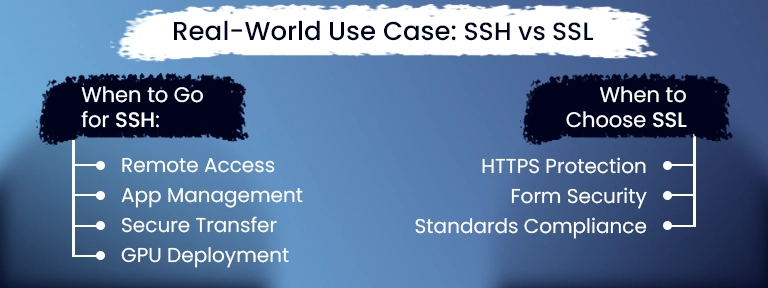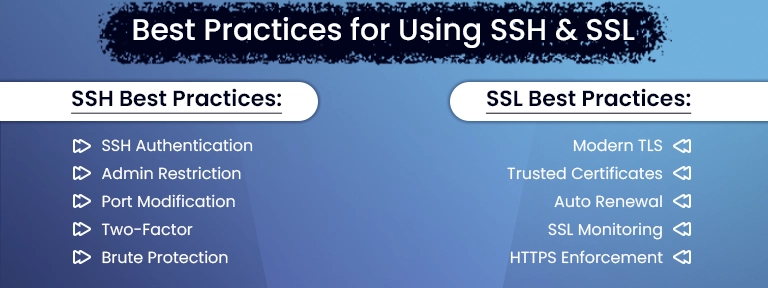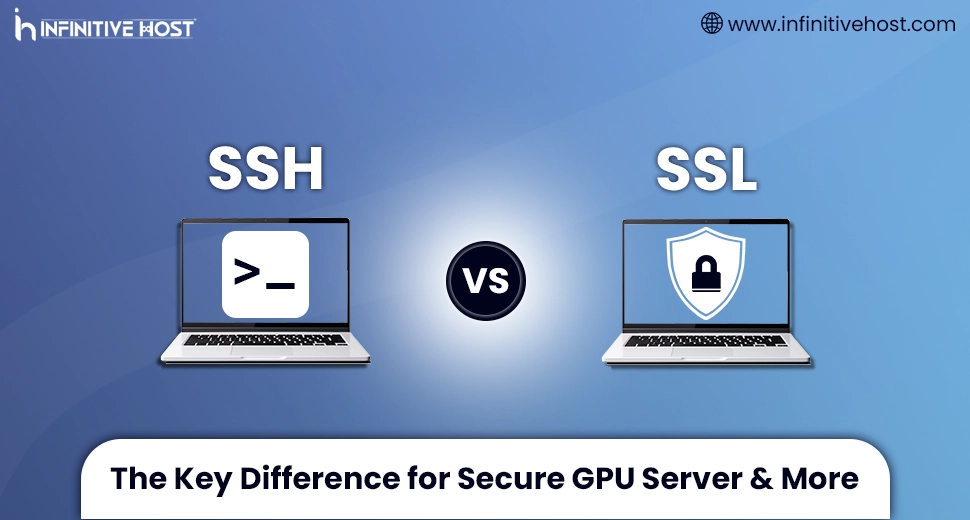SSH vs SSL: The Key Difference for Secure GPU Server & More
At the time of handling advanced infrastructures such as a GPU server, Linux Cloud VPS, or cloud hosting platforms, guaranteeing protected data transmission and server access is non-negotiable. That’s where two robust technologies—SSH vs SSL—play an important part. But what really do they do? Are they replaceable? And how do they easily fit into hosting services like a GPU dedicated server or Linux hosting?
This knowledge base breaks down SSH vs SSL, helping you know about the key differences, real-world use cases, and practical implications, mainly when working with service providers such as Infinitive Host.
What is SSH?
SSH (stands for Secure Shell) is a cryptographic network protocol generally utilized to quickly access remote machines safely over an unprotected network. It’s the go-to tool for admins handling Linux Cloud VPS, Linux hosting, or a GPU dedicated server.
Key Benefits of SSH:
- Encrypted Remote Access: SSH easily encodes commands and file transfers, making sure that no personal data is shown in transit.
- Command-Line Access: It’s most generally utilized to quickly access servers with the help of CLI (Command-Line Interface).
- File Transfer Capabilities: SCP & SFTP are safe methods for file transfer utilizing SSH.
What is SSL?
SSL (stands for Secure Sockets Layer), and more precisely its successor TLS (Transport Layer Security), is a cryptographic protocol utilized to protect communication over the web, mainly for all those sites that are hosted on cloud hosting or Linux hosting environments.
Key Benefits of SSL:
- Website Encryption: It guarantees that data sent between a user’s search browser and the server is encrypted.
- HTTPS Support: Start the padlock in your chosen browser, signifying protected web communication.
- Trust and Authentication: Gain users’ trust, which is necessary for SEO and e-commerce.
SSH vs SSL: The Fundamental Differences
The difference between SSH vs SSL is not all about which is good—it’s about utilizing the appropriate tool for the perfect job. Here is how they compare:
| Feature | SSH | SSL |
| Purpose | Protect remote login & command execution. | Secure web-powered communication. |
| Port | Default port 22 | Default port 443 |
| Common Use Cases | Accessing servers, transferring demanded files. | Securing sites, web applications, and APIs. |
| Protocols Involved | SSH protocol | SSL/TLS protocol |
| Encryption Method | Asymmetric with session key negotiation. | Asymmetric with digital certificates. |
| Applications | Handling a GPU server, Linux Cloud VPS. | Safeguarding cloud hosting, HTTPS sites. |
Real-World Use Case: SSH vs SSL

When to Choose SSL:
If you are hosting a client-experiencing site or app utilizing cloud hosting or Linux hosting, SSL is essential to:
- Enable HTTPS and protect user data.
- Safeguard login details and form submissions.
- Comply with safety standards such as PCI DSS.
Think of SSL as the bodyguard of your public-facing services, while SSH safeguards your backend access.
When to Go for SSH:
If you are working with a GPU dedicated server on Infinitive Host, you’ll most likely use SSH to:
- Log in remotely to your Linux system.
- Handle all server-side apps.
- Transfer data files safely.
- Set up GPU tasks in environments such as TensorFlow.
In this case, SSH is the core of server management, mainly in developer-intensive environments.
SSH vs SSL in GPU Hosting Environments
In the advanced GPU hosting setups, mainly those consisting of AI/ML, the main difference between SSH and SSL becomes clearer:
- SSH is utilized to remotely access the GPU dedicated server, install dependencies, handle training scripts, and check performance logs.
- SSL is utilized if your GPU-based application (for example, AI APIs or web dashboards) is served over the whole web, guaranteeing the communication between all end users and the server is fully encrypted.
For Instance:
You utilize SSH to log into your Infinitive Host-powered GPU dedicated server and set up your AI-based model. Once quickly deployed as an API, you protect its endpoint with SSL.
Security Comparison: SSH vs SSL
SSH Security
- Utilizes asymmetric encryption for verification.
- Allows all password- or key-powered logins (key-based is highly suggested).
- Brute-force and port-scanning threats are very basic; hence, they should be reduced by firewalls and rate-limiting.
SSL Security
- Depends on SSL/TLS certificates powered by Certificate Authorities (CAs).
- Vulnerabilities occur from expired or improperly set up certificates.
- General attacks include SSL stripping and man-in-the-middle (MitM), which can be prevented by utilizing HSTS and powerful cipher suites.
Best Practices for Using SSH & SSL

If you are on a Linux Cloud VPS, a GPU hosting solution, or a cloud hosting stack, here’s how to protect your environment productively:
SSH Best Practices:
- Utilize SSH keys rather than passwords.
- Disable admin login.
- Change default port (22).
- Allow two-factor verification.
- Utilize tools such as fail2ban to avoid brute-force attacks.
SSL Best Practices:
- Utilize modern TLS versions.
- Utilize certificates from reliable authorities (Let’s Encrypt and many more).
- Set up automatic certificate renewals.
- Constantly check the SSL setup with the help of tools like Qualys SSL Labs.
- Enforce HTTPS using .htaccess or server setup.
SSH vs SSL with Infinitive Host
At Infinitive Host, we offer highly protected access protocols as the core of our GPU server, Linux hosting, and cloud hosting plans. Here’s what you get:
SSH Access:
Flawlessly manage your GPU dedicated server and quickly deploy tasks safely with complete SSH access.
SSL Support:
All our web hosting solutions come with free SSL certificate support, guaranteeing that your sites and APIs stay encrypted and protected.
Summary: SSH vs SSL: Not a Competition, but a Combo
Knowing about SSH vs SSL is very important for all those who are managing servers, mainly in environments such as GPU hosting or Linux Cloud VPS. They serve uniquely yet equally necessary purposes:
- SSL protects all your frontend user-side communication.
- SSH protects your backend server access.
When both of them are utilized collaboratively, they form a powerful security strategy that always keeps your hosting environment both functional and secure.
With the help of Infinitive Host, you’re not only getting tier-4 infrastructure—you are getting security-first solutions, even if you are deploying AI-based models, running high-performance sites, or handling flexible cloud applications.
